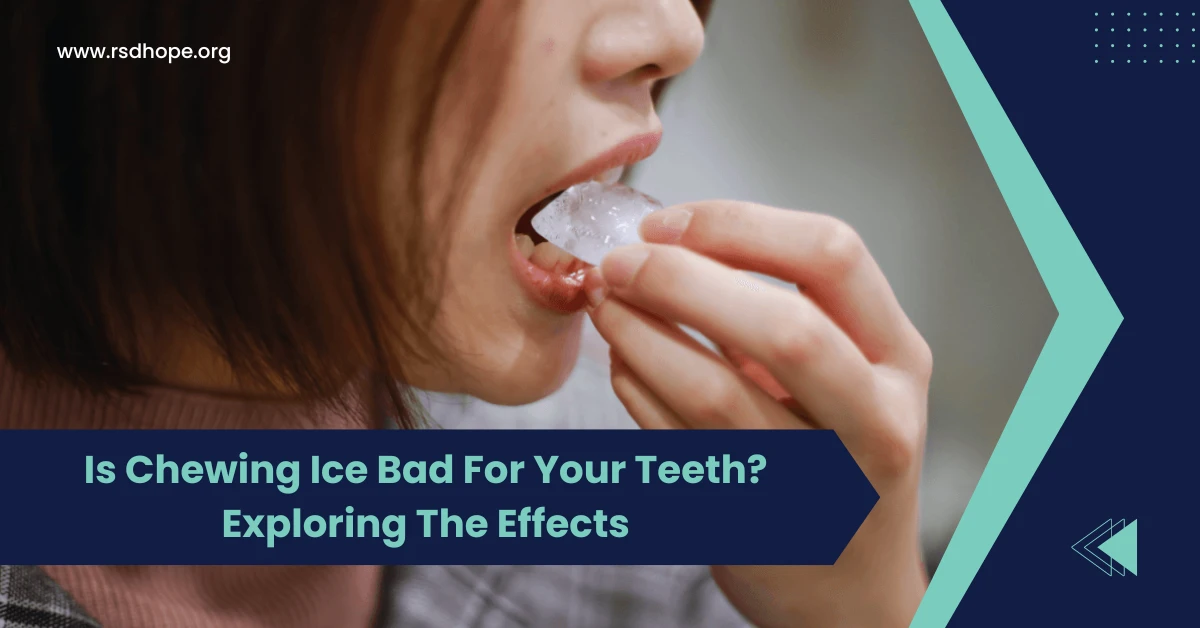Chewing ice is a common habit that many people find satisfying and refreshing. Whether it’s a way to cool down on a hot day or a mindless habit while enjoying a beverage, ice chewing has become increasingly popular.
However, have you ever stopped to consider the potential effects of this habit on your dental health? In this blog post, we’ll explore the surprising truth about chewing ice and its impact on your teeth and gums.
Key Takeaways
- Chewing ice can lead to tooth enamel damage, sensitivity, and fractures.
- The habit may be a sign of an underlying health condition, such as iron deficiency anemia or pica disorder.
- Breaking the ice-chewing habit is essential for maintaining good oral health and preventing dental issues.
Why do people chew ice?
People chew ice for various reasons, and understanding the underlying cause can help address the habit effectively. One possible explanation is a condition called pica, which is characterized by a craving for non-food items, including ice. In some cases, ice chewing may be a sign of iron deficiency anemia, as the cold sensation can provide temporary relief from the discomfort associated with the condition.
For others, chewing ice may simply be a sensory stimulation or a way to relieve stress and anxiety. The satisfying crunch and the cooling sensation can provide a sense of comfort and distraction from daily stressors.
Also Read: Does Lyme Disease Make Your Teeth Fall Out? Know The Truth
Is chewing ice bad for your teeth?
The short answer is yes, chewing ice can be detrimental to your dental health. While tooth enamel is the hardest substance in the human body, regularly chewing on hard, frozen objects like ice can cause significant damage over time.
The cold temperature and the hardness of ice can cause tooth enamel to weaken and become more susceptible to chips, cracks, and fractures. This damage can lead to increased tooth sensitivity, as the underlying dentin layer becomes exposed.
Moreover, the constant pressure and grinding motion involved in ice chewing can put excessive stress on your teeth and jaw, leading to potential dental restorations like fillings or crowns.
The Effects of Ice on Teeth and Gums
Let’s dive deeper into the specific effects of ice chewing on your oral health. Tooth enamel, the protective outer layer of your teeth, can gradually erode due to repeated exposure to the hard, cold surface of ice. This erosion can make your teeth more vulnerable to decay and cavities, as the enamel becomes thinner and less resistant to harmful bacteria.
In addition to enamel damage, chewing ice can also cause tooth fractures, especially if you have existing dental work or weakened teeth. The sudden, intense pressure from biting down on a hard piece of ice can cause a tooth to crack or chip, requiring expensive dental treatments to repair.
Your gum health can also be compromised by the habit of chewing ice. The sharp edges of the ice can irritate and cut your gums, leading to inflammation and bleeding. Over time, this repeated trauma can cause your gums to recede, exposing the sensitive roots of your teeth and increasing the risk of gum disease.
Tips for Breaking an Ice Eating Habit
If you find yourself habitually chewing on ice, it’s essential to take steps to break the habit and protect your dental health. Here are some practical tips to help you quit:
- Identify triggers: Pay attention to when and why you reach for ice. Is it when you’re stressed, bored, or thirsty? Understanding your triggers can help you find alternative coping mechanisms.
- Find substitutes: Replace ice with healthier, crunchy alternatives like carrots, celery, or sugar-free gum. These options can provide a similar satisfying sensation without damaging your teeth.
- Address underlying health issues: If your ice chewing habit is related to a condition like iron deficiency anemia or pica, it’s crucial to seek medical advice and treat the underlying cause.
- Practice mindfulness: Be conscious of your habit and make a deliberate effort to avoid chewing ice. Whenever you find yourself reaching for an ice cube, take a moment to pause and choose a different action.
- Maintain good oral hygiene: Regular brushing, flossing, and dental check-ups can help keep your teeth and gums healthy, making them more resilient to the effects of ice chewing.
Conclusion
Chewing ice may seem like a harmless habit, but it can have serious consequences for your dental health. From enamel erosion and tooth fractures to gum irritation and recession, the risks associated with ice chewing are not to be taken lightly.
By understanding the potential dangers and taking steps to break the habit, you can protect your teeth and gums from unnecessary damage. Remember, your oral health is a vital component of your overall well-being, and taking care of your smile is an investment in your long-term health and confidence.
If you’re struggling to quit chewing ice or experiencing any dental issues related to the habit, don’t hesitate to seek professional advice from your dentist. They can provide personalized guidance and treatment options to help you maintain a healthy, beautiful smile for years to come.
Read More: How To Remove Stains From Teeth? Find Effective Tips And Tricks
FAQs
A: While occasional ice chewing may not cause immediate harm, it’s best to avoid the habit altogether to prevent potential dental issues.
A: Yes, chewing ice can lead to tooth sensitivity by weakening and eroding the protective enamel layer, exposing the sensitive dentin beneath.
A: To stop chewing ice, identify your triggers, find healthier substitutes, address underlying health issues, practice mindfulness, and maintain good oral hygiene.
A: If you chip a tooth from chewing ice, contact your dentist immediately for an evaluation and appropriate treatment to prevent further damage and pain.
Citations:

